Related Research Articles

William Russell is an English dramatist, lyricist and composer. His best known works are Educating Rita, Shirley Valentine, Blood Brothers and Our Day Out.

Barbara Ruth Dickson is a Scottish singer and actress whose hits include 'I Know Him So Well', 'Answer Me' and 'January February'. Dickson has placed fifteen albums on the UK Albums Chart from 1977 to date, and had a number of hit singles, including four which reached the top 20 on the UK Singles Chart. The Scotsman newspaper has described her as Scotland's best-selling female singer in terms of the numbers of hit chart singles and albums she has achieved in the UK since 1976.
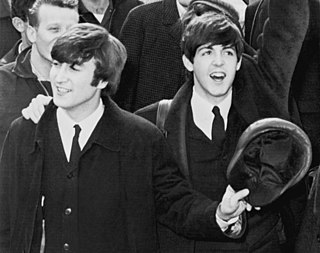
Lennon–McCartney was the songwriting partnership between English musicians John Lennon (1940–1980) and Paul McCartney of the Beatles. It is the best-known and most successful musical collaboration ever by records sold, with the Beatles selling over 600 million records worldwide as of 2004. Between 5 October 1962 and 8 May 1970, the partnership published approximately 180 jointly credited songs, of which the vast majority were recorded by the Beatles, forming the bulk of their catalogue.

"Maxwell's Silver Hammer" is a song by the English rock band the Beatles from their 1969 album Abbey Road. It was written by Paul McCartney and credited to the Lennon–McCartney partnership. The song is about a student named Maxwell Edison who commits murders with a hammer, with the dark lyrics disguised by an upbeat sound. McCartney described the song as symbolic of the downfalls of life, being "my analogy for when something goes wrong out of the blue, as it so often does".
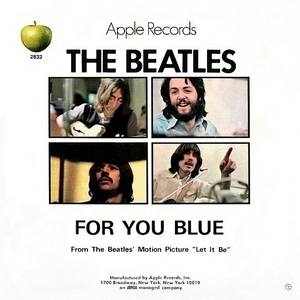
"For You Blue" is a song by the English rock band the Beatles from their 1970 album Let It Be. The track was written by George Harrison as a love song to his wife, Pattie Boyd. It was also the B-side to the "Long and Winding Road" single, issued in many countries, but not Britain, and was listed with that song when the single topped the US Billboard Hot 100 and Canada's national chart in June 1970. On the Cash Box Top 100 chart, which measured the US performance of single sides individually, "For You Blue" peaked at number 71.
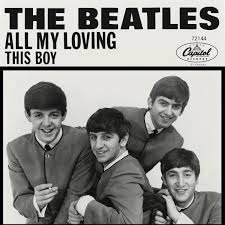
"This Boy" is a song by the English rock band the Beatles, written by John Lennon (credited to Lennon–McCartney). It was released in November 1963 as the B-side of the band's Parlophone single "I Want to Hold Your Hand". In the United States, it was issued in January 1964 on Meet the Beatles! which was Capitol Records' reconfigured version of the With the Beatles album. The Beatles performed the song live on 16 February 1964 for their second appearance on The Ed Sullivan Show. An instrumental easy listening arrangement by George Martin, re-titled "Ringo's Theme (This Boy)", was featured in the film A Hard Day's Night and the United Artists soundtrack album. This version was also issued as a single, reaching number 53 in the US and number one in Canada.
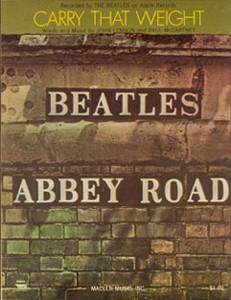
"Carry That Weight" is a song by the English rock band the Beatles from their 1969 album Abbey Road. Written by Paul McCartney and credited to Lennon–McCartney, it is the seventh and penultimate song in the album's climactic side-two medley. It features unison vocals in the chorus from all four Beatles, a rarity in their songs. It is preceded by "Golden Slumbers" and segues into "The End".
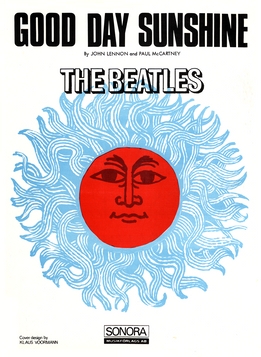
"Good Day Sunshine" is a song by the English rock band the Beatles from their 1966 album Revolver. It was written mainly by Paul McCartney and credited to the Lennon–McCartney partnership. McCartney intended it as a song in the style of the Lovin' Spoonful's contemporaneous hit single "Daydream". The recording includes multiple pianos played in the barrelhouse style and evokes a vaudevillian mood.

"You're Going to Lose That Girl" is a song by the English rock band the Beatles from their 1965 album and film Help! Credited to the Lennon–McCartney songwriting partnership, the song was mostly written by John Lennon with contributions from Paul McCartney.
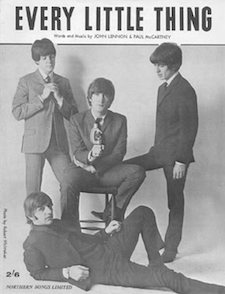
"Every Little Thing" is a song by the English rock band the Beatles from their album Beatles for Sale, issued in the UK in December 1964. Credited to Lennon–McCartney, it was written by Paul McCartney. Capitol Records first issued the song in the US on Beatles VI in June 1965. The track is an early example of the Beatles' use of non-rock instrumentation on a recording, through the addition of timpani drum over the choruses.

"Old Brown Shoe" is a song by the English rock band the Beatles. Written by George Harrison, the group's lead guitarist, it was released on a non-album single in May 1969, as the B-side to "The Ballad of John and Yoko". The song was subsequently included on the band's compilation albums Hey Jude, 1967–1970 and Past Masters, Volume Two. Although "Old Brown Shoe" remains a relatively obscure song in the band's catalogue, several music critics view it as one of Harrison's best compositions from the Beatles era and especially admire his guitar solo on the track.
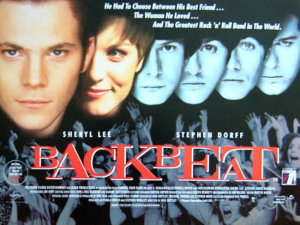
Backbeat is a 1994 independent drama film directed by Iain Softley. It chronicles the early days of the Beatles in Hamburg, Germany. The film focuses primarily on the relationship between Stuart Sutcliffe and John Lennon, and also with Sutcliffe's German girlfriend Astrid Kirchherr. It has subsequently been made into a stage production.
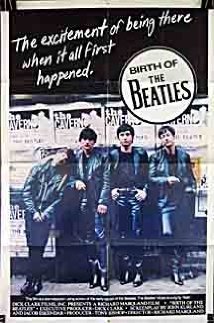
Birth of the Beatles is a 1979 American biographical film, produced by Dick Clark Productions and directed by Richard Marquand. The film was released into cinemas worldwide, except in the United States, where it was shown as a TV film on ABC. The film focuses on the early history of the Beatles. It was released nine years after the announced break-up of the Beatles themselves, and is the only Beatles biopic to be made while John Lennon was still alive. Pete Best, the Beatles' original drummer, served as a technical advisor for the production.
"I'm the Greatest" is a song written by English musician John Lennon that was released as the opening track of the 1973 album Ringo by Ringo Starr. With Starr, Lennon and George Harrison appearing on the track, it marks the only time that three former Beatles recorded together between the band's break-up in 1970 and Lennon's death in 1980. Lennon wrote the song in December 1970 as a wry comment on his rise to fame, and later tailored the lyrics for Starr to sing. Named after one of Muhammad Ali's catchphrases, the song partly evokes the stage-show concept of the Beatles' 1967 album Sgt. Pepper's Lonely Hearts Club Band.
The Beatles Anthology is a documentary television series on the career of the Beatles. It was broadcast on UK television in eight parts on ITV between 26 November and 31 December 1995, while in the United States it was seen as three feature-length episodes on ABC between 19 and 23 November 1995. It was released in greatly expanded form as an eight-volume VHS set and an eight-disc LaserDisc set on 5 September 1996. The series was re-released on DVD in 2003, with an 81-minute special-features disc.
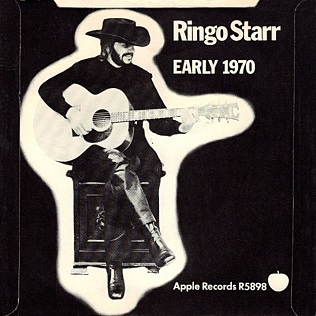
"Early 1970" is a song by English rock musician Ringo Starr that was released as the B-side of his April 1971 single "It Don't Come Easy". A rare example of Starr's songwriting at the time, it was inspired by the break-up of the Beatles and documents his relationship with his three former bandmates. The lyrics to the verses comment in turn on Paul McCartney, John Lennon and George Harrison as individuals, and the likelihood of each of them making music with Starr again. In the final verse, Starr offers a self-deprecating picture of his musical abilities and expresses the hope that all four will play together in the future. Commentators have variously described "Early 1970" as "a rough draft of a peace treaty" and "a disarming open letter" from Starr to Lennon, McCartney and Harrison.
After the break-up of the Beatles in April 1970, John Lennon, Paul McCartney, George Harrison and Ringo Starr enjoyed success as solo artists and collaborated with each other on numerous occasions, including on both studio and live recordings. However, none of these collaborations included all four members, with the exception of "Free as a Bird" (1994) and "Real Love" (1995).
The Beatles 1964 world tour was the Beatles' first world tour, launched after their 1964 UK tour. The reception was enthusiastic, with The Spectator describing it as "hysterical". It was followed by their subsequent North American tour in August that year.
The Roy Orbison/The Beatles Tour was a 1963 concert tour of the United Kingdom by Roy Orbison and the Beatles. Other acts on the tour included Gerry and the Pacemakers, David MacBeth, Louise Cordet, Tony Marsh, Terry Young Six, Erkey Grant, and Ian Crawford. It was Orbison's first, and the Beatles' third nationwide tour of the UK. Although Orbison was originally intended to be the headlining act, the reaction to the Beatles on the tour caused them to be promoted to co-headliners, with the Beatles closing the set in the traditional headlining spot.
Everyday Chemistry is a remix album that was made available as a free digital download on 9 September 2009. The album was released along with a story of anonymous authorship. It mashes up various songs from the Beatles' individual solo careers, including tracks from 27 albums. The album portrays itself as being taken from an alternate universe in which the Beatles had not broken up.
References
- ↑ "John Paul George Ringo ... & Bert". Willy Russell.
- ↑ "John, Paul, George, Ringo... & Bert". Userpages.umbc.edu.
- ↑ Beatlesnumber9. "George Harrison Creem Interview". Beatlesnumber9.com.
- ↑ "John Paul George Ringo ... & Bert". Jpgr.co.uk. 15 August 1974.
- ↑ Archived 13 January 2008 at the Wayback Machine
- ↑ Sounes, Howard (2010). Fab: An Intimate Life of Paul McCartney . Da Capo Press. p. 317. ISBN 978-030681783-0.